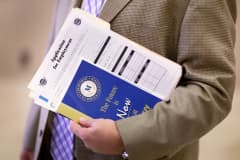On a cold October morning, just after the federal government shutdown came to an end, Jenner Barrington-Ward headed into court in Boston to declare bankruptcy.
It took weeks to put the paperwork together, given that her papers and belongings were scattered across the country — there was a broken-down car and boxes of paperwork in Virginia Beach, clothes in Colorado and personal possessions at a friend's house in Somerville, Mass. She managed to estimate her income — maybe $5,000 last year, but maybe half that this year — from odd jobs. Soon, she would officially have nothing.
It has been a painful slide. A five-year spell of unemployment has slowly scrubbed away nearly every vestige of Ms. Barrington-Ward's middle-class life. She is a 53-year-old college graduate who worked steadily for three decades. She is now broke and homeless.
(Read more: Job creation soars in October)
Ms. Barrington-Ward describes it as "my journey through hell." She was laid off from an administrative position at the Massachusetts Institute of Technology in 2008; she had earned about $50,000 that year. With the recession spurring employers to dump hundreds of thousands of workers a month and the unemployment rate climbing to the double digits, she found that no matter the number of résumés she sent out — she stopped counting in the thousands — she could not find work.










